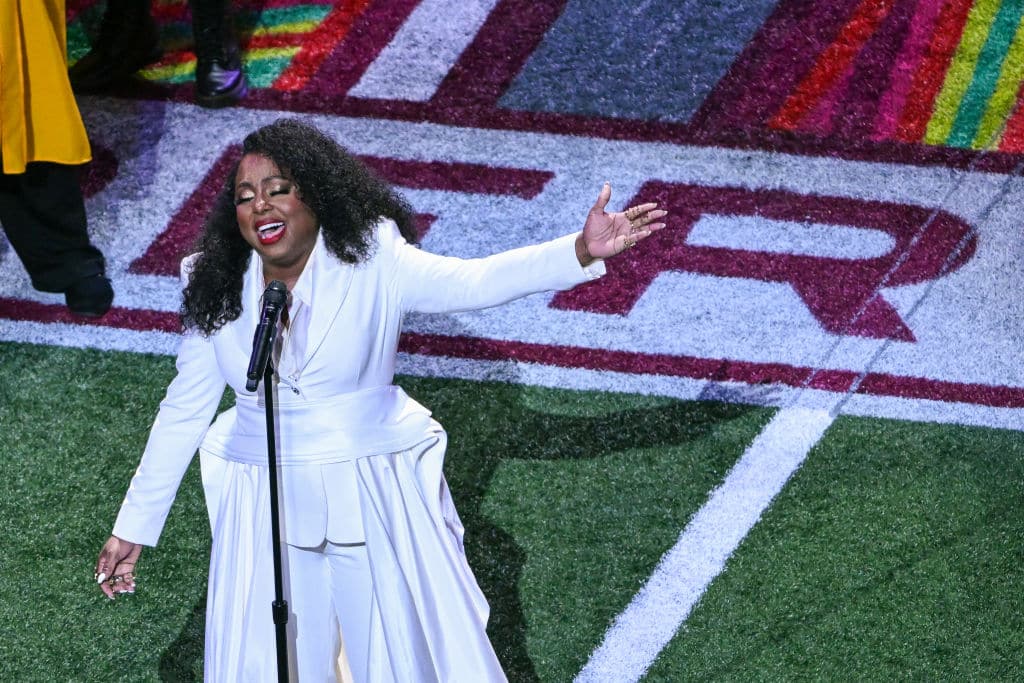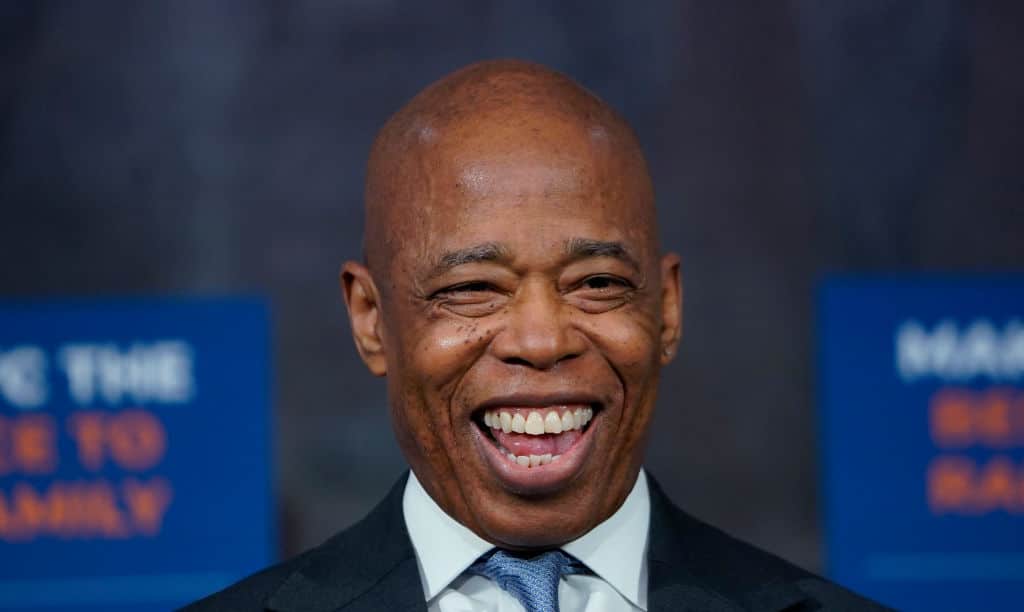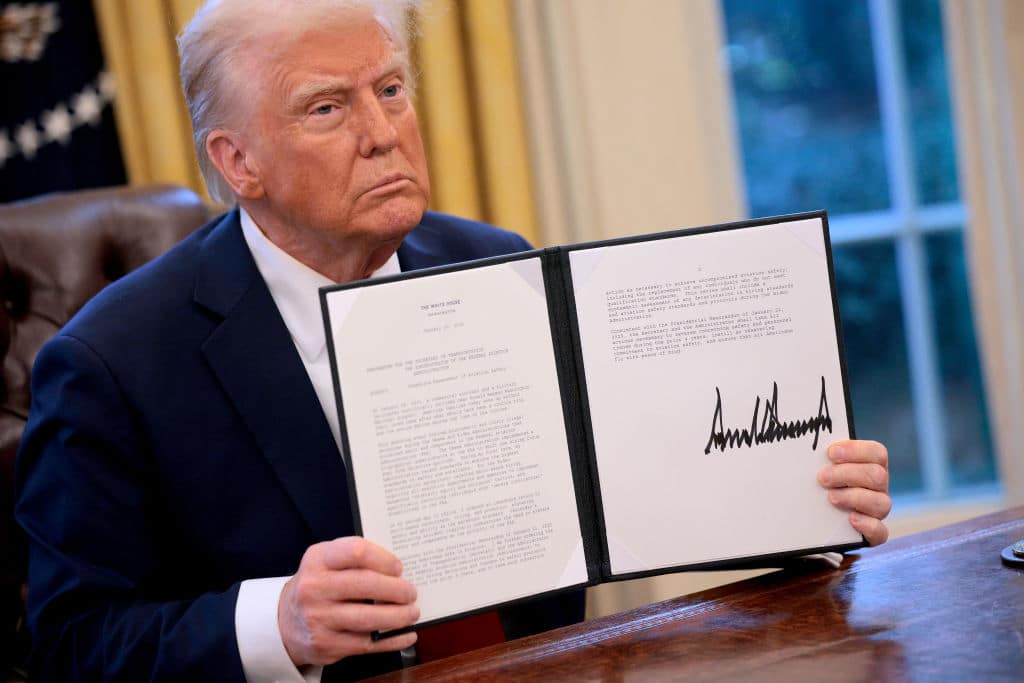black history month
HipHopWired Featured Video
Source: TIMOTHY A. CLARY / Getty
New York City Mayor Eric Adams came under fire for his referring to Black leaders asking him to resign as “negroes” and invoking Jesus in a speech.
There is more trouble surrounding New York City Mayor Eric Adams after his recent comments at a Black History Month event at his mayoral residence, Gracie Mansion. In his speech on Tuesday (Feb. 25), he chastised Black politicians who called for him to step down in the wake of Adams agreeing to work with President Donald Trump while federal corruption charges against him could be dropped. “This is a biblical moment,” Adams began, continuing: “When Jesus was on the cross, he said, ‘God forgive them for they know not what they do. All these negroes who are asking me to step down, God forgive them.”
Adams would end up in a testy exchange when questioned by Curt Menefee, the co-anchor of Fox 5’s Good Day New York program on Wednesday (Feb. 26). “Are you implying that if you’re Black, you have to support you?” Menefee asked. “No, not at all. I’m asking for all New Yorkers to support me,” Adams replied, prompting Menefee to pointedly ask, “Are you saying all New Yorkers are negroes?” Adams seemed flustered, defending himself by saying: “I thought I was very clear in my definition of what I said … you got 8.3 million New Yorkers, 8.3 million people didn’t call for me to step down. I get just the opposite when I’m in the streets.”
“So anybody who’s Black who calls for you to step down, they need help from God. I’m focusing on this because your use of the word negro has come up repeatedly over the last couple of weeks, and I think some people actually have an issue with that term,” replied Menefee, adding, “So explain who you’re talking to when you use that term specifically.” Adams would deflect.
The exchange reflected the growing dissatisfaction with Adams in the Black community in recent weeks. Harlem-based Reverend Johnnie Green expressed his displeasure. “I think all spiritual leaders in this town are appalled by it,” Green said of the remarks. “It just shows you the times in which we live how dangerously wicked people can be… He is no savior, he is no Christ, he is no sacrificial lamb.” Public Advocate Jumanne Williams also blasted Adams. “You can see someone who is in major crisis and has no ability to look within, that is a very dangerous person to have running the city.”

HipHopWired Featured Video
CLOSE
Source: JIM WATSON / Getty / White House
Donald Trump and his lame administration are working hard to set the advancement of Black culture back years with the removal of DEI programs, but that’s not stopping these Black celebrities from joining him at the White House to celebrate Black History Month.
The Associated Press reports that Donald Trump’s White House will host a Black History Month event on Thursday, and the who’s who of sellouts will be in attendance to celebrate the jig.
According to the website, Trump’s heada** pick to be ambassador to t Herschel Walker, Trump’s favorite African American, Tim Scott of South Carolina, Republican Rep. John James of Michigan, prison reform advocate and recipient of a Trump pardon in 2020 thanks to Kim Kardashian Alice Johnson, and Martin Luther King Jr.’s niece, Alveda King will join Felon 47 in the East Room for the event.
Other notable sellouts in attendance will be former ESPN host Sage Steele, Kodak Black, Lil Boosie, who recently begged Trump for a pardon on X, formerly Twitter, and Rod Wave, fresh off from performing at the Crypto Ball alongside Snoop Dogg.
The event was scheduled for last week but was postponed due to inclement weather.
Social media has been responding accordingly to the list of names who will be at the event.
“Sorry but ever single attendee (including that fuck ass president) is a cte having criminal degenerate,” one person on X wrote, adding a long rap sheet of problematic behavior from Rod Wave.
Luke Cage showrunner Cheo Hodari Coker added, “Glad to hear our best and brightest will represent us….and if you don’t hear the sarcasm in my voice, you clearly don’t follow me on here.
The list of Black Trumpers continues to grow. Never forget these people were on the wrong side of history.
You can see more reactions in the gallery below.
4. Exactly
7. “Jigaboo Jubilee” HOWLING
Colombia is known for its very rich and diverse culture, including its array of musical styles from vallenato to salsa to champeta to música popular, and beyond.
Among its numerous international artists that include Shakira, Feid, Carlos Vives, Karol G, Juanes, and more, are key Afro-Colombian artists that have also shaped the country’s music industry: salsa giants Grupo Niche and the Latin Grammy-winning ChocQuibTown, for example.
The former, co-founded by the late Jairo Varela and Alexis Lozano, is named “Niche” after a name that is used to refer to dark-skinned people. Last year, Grupo Niche celebrated 40 years of its timeless hit “Cali Pachanguero,” dedicated to the city of Cali, Colombia — with its bustling carnivals, lively atmosphere and beautiful people — narrated by someone who’s far away and yearns to go back home.
“This song was already born big,” the group previously told Billboard of the song’s impact. “Just by the success it had at the fair in 1984, it began to move masses. In fact, at the beginning of those years, the song was only played in Cali because it was from that city. But today, the song has to be played everywhere. It’s a must-play song [at our concert]. Everywhere [in the world], people assume it as their own.”
Other Afro-Colombians that have led the charge include Latin Grammy Lifetime Achievement Award honoree Totó La Momposina; Mr. Black, credited with helping steer the champeta movement; and Mauro Castillo, known for his lead role on “We Don’t Talk About Bruno” in Disney’s blockbuster Encanto.
Now, in honor of Black History Month, Billboard Latin highlights a wave of emerging Afro-Colombian artists that we have discovered, and should be on your radar. Check them out in alphabetical order below:
50thy

HipHopWired Featured Video
CLOSE
Source: PA Wire – PA Images / Getty / Ledisi
As expected, the MAGA contingent was once again BIG MAD at the Black National Anthem being sung at the Super Bowl.
Will this be an annual thing, or will the Orange Menace, aka Donald Trump, sing one of his useless executive orders ordering all American sports leagues only to perform the National Anthem and sporting events?
Even though the NFL has gotten rid of the “end racism” signage in the back of endzones for the Super Bowl, they still kept the singing of “Lift Every Voice” ahead of kickoff, a move the league adopted in 2020 in the wake of protests following the murder of George Floyd at the hands of police.
The song was adopted by the National Association for the Advancement of Colored People (NAACP) and is commonly called the Black National Anthem.
Louisiana-born singer Ledisi performed the song in New Orleans ahead of Super Bowl LIX in front of Felon 47 Donald Trump, and the performance was magnificent.
Unfortunately, like last year, the MAGA cult was BIG MAD at the idea of the hymn being used as a separate anthem in a league that features predominantly Black players.
Right-wing commentators such as Charlie Kirk sounded off on the performance. “Only our actual national anthem should be performed at the Super Bowl,” Kirk wrote.
“Black National Anthem’ is a racist relic left over from the BLM era. Get rid of it,” the lame account End Wokeness said on X, formerly Twitter.
Another crappy account R T wrote, “Just muted the Black National Anthem. There’s one national anthem for this country and that ain’t it. We’re all Americans, not divided by Race, Creed, Sex or Religious Preference.”
Black Xitter Loved Ledisi’s Performance
Thankfully, Black Xitter loved seeing MAGA all butt-hurt about the performance of the hymn.
“Yes, the Black National Anthem does deserve to be a part of the Anthems we sing at the Super Bowl. Why? Because Black History is American History,” one post on X read.
Another post read, “Baby, #Ledisi sang the Black National Anthem from her soul and pit of her stomach! The ancestors are proud!”
They can honestly stay mad. The NFL better not let these people influence them into taking out the Black National Anthem.
You can see more reactions in the gallery below.
2. Yes, yes it was
4. Oh they were big mad
5. It was Black as hell, and we loved it.
7. Never fails
HipHopWired Featured Video
Source: Chip Somodevilla / Getty
An agency at the Pentagon has paused observing Black History Month and Martin Luther King Jr. Day at the behest of President Donald Trump.
According to reports, the Defense Department’s intelligence agency has halted observances of Black History Month, Dr. Martin Luther King Jr. Day, and other cultural and historical events. The directive, revealed in a leaked memo, is following an executive order signed by President Donald Trump targeting diversity, equity, and inclusion (DEI) on his first day back in office on Jan. 20. An unnamed official verified the memo’s authenticity.
Related Stories
“We are receiving questions across the workforce on the way forward,” the memo said. “DIA will pause all activities and events related to Agency Special Emphasis Programs effective immediately and until further notice.” The memo calls for a halt of observing 11 events including Asian American Pacific Islander Heritage Month, National American Indian Heritage Month, National Disability Employment Awareness Month, Women’s Equality Day, and Women’s History Month.
The source said the change would not affect the holidays being celebrated nationally, and it’s not policy across the Department of Defense. But Secretary of Defense Pete Hegseth instructed his staff last Wednesday (Jan. 29) to create a task force to eliminate DEI programs from the Pentagon. “We’re not joking around,” Hegseth said in an interview Wednesday with Fox News when asked about it. “There’s no changing of names or softly manipulating something. DEI is gone.”
The backlash has hit the White House, particularly as Black History Month kicked off Saturday (Feb. 1). White House Press Secretary Karoline Leavitt addressed the controversy Friday (Jan. 31) and tried to downplay it. “As far as I know, this White House certainly still intends to celebrate, and we will continue to celebrate American history and the contributions that all Americans, regardless of race, religion, or creed, have made to our great country,” she said. Trump would then sign a proclamation later that day declaring that Black History Month be observed by “public officials, educators, librarians, and all the people of the United States to observe this month with appropriate programs, ceremonies, and activities,” although there were no further details on what those programs would be.

For Black History Month, Billboard is celebrating by highlighting some of the greatest Black executives in music. And today, we’re celebrating Top Dawg. Anthony “Top Dawg” Tiffith:You know me, I’m like behind the scenes all the time. Tetris Kelly:For Black History Month, Billboard is celebrating by highlighting some of the greatest Black executives in music. […]
For Black History Month, Billboard is celebrating by highlighting some of the greatest Black executives in music, and today we’re celebrating MVD publicists Massah David and Miatta Johnson. The sibling duo, who are repping Liberia, founded the boutique creative agency MVD Inc. with the goal of amplifying Black storytelling, and they do it by producing […]
HipHopWired Featured Video
Source: Fadi Kheir / Courtesy of Carnegie Hall
It’s the eve of Valentine’s Day on a snow-melting New York City evening. Black couples draped in their finest $5,000-a-plate fur-cloaked gala attire wandered around a half-filled Carnegie Hall auditorium, seeking and finding a place to purchase cocktails in the the Sanford I. Weill Cafe.
Source: Fadi Kheir / Courtesy of Carnegie Hall
Among the aforementioned are business casual and informally dressed attendees, some even in snow boots and leisurewear. They all learned about the Power Network’s “A Black History Month Conversation and Celebration.” Its purpose was to unite a niche audience commemorating Black excellence with decorated professionals, followed by an exhilarating mini-concert by Rick Ross hosted by legendary radio personality, Ed Lover.
Event organizers Lew Tucker and Terry Ross invited an impressive selection of renowned guest speakers and panelists tasked to discuss tangible ways technology, artificial intelligence and politics can leapfrog an encumbered community out of multi-generational poverty. Each subject matter expert offered their brand of solutions – voting, equity ownership and advanced education were at the top of the list for the most part. However, some conversations had such galvanizing perspectives, making the call to action a revolution worth exploring.
In the first panel of the night, moderator and Vibranium Central Foundation executive Derek Ferguson kicked off the discussion with a malfunctioned video clip of the late Nipsey Hussle discussing the distrust in cryptocurrencies in Black communities and his desire to remediate it with technology. Megan Holston-Alexander, a partner at Andreessen Horowitz heading the Cultural Leadership Fund in Silicon Valley, discussed how the power of equity ownership in tech is a fast track to bridging the wage gap if investors are strategic enough to secure it.
An easy way to bypass an often impenetrable venture capital fund is through “employment-ship,” as she describes. Candidates would seek employment at a budding tech start-up and secure company stock through a compensation package, which can instantly become worth millions if a larger company acquires the business or goes public on the stock market. It’s extended gameplay but has given professionals an expedited pathway toward real wealth.
Ron Busby Sr., a business executive at U.S. Black Chambers Inc., reminded the audience how the government glosses over Black issues by enveloping other ethnicities into federal funding under the umbrella term “minority,” which he claims has served white women the most at an astounding 78% of the budget. If Black enterprises certify their businesses on byblack.us as Black-owned businesses, they actively create a demand for federal dollars explicitly earmarked for Black business owners. Additionally, using acquisitions by becoming a 51% owner of small companies would help expand their businesses and aid them in gaining larger contracts that are otherwise inaccessible to small businesses.
Source: Fadi Kheir / Courtesy of Carnegie Hall
The second act of the event was a pleasant pivot into political activism with Maryland Gov. Wes Moore, moderated by Earn Your Leisure founders Rashad Bilal and Troy Millings.
Moore’s decorated life story is one for the books. The former Robin Hood CEO, who once managed to distribute $600 million towards impoverished families before taking his talents into politics in 2023, won his first elected seat into office on the first try.
His new career starts without deep political ties, which historically has muddled the landscape along with backroom deals and false promises to its constituents. Instead, Moore’s business-minded approach focuses on demolishing generational poverty in the Black community through policy.
From his perspective, gaining access to the state budget has given him a unique understanding of how deliberate policy-driven racism has strategically pigeonholed Black Americans into disenfranchisement.
Source: Fadi Kheir / Courtesy of Carnegie Hall
Billionaire Robert F. Smith, who also serves as Carnegie Hall’s chairman, joined the governor’s conversation with HarbourView CEO Sherrese Clarke Soares. The refreshed panel closed out the final segment of the evening. Both executives spoke in depth about the impact technology and AI will have on the future of Black families in America.
Smith highlighted the underrepresentation of Black professionals in tech and the dangers it threatens as AI amalgamates itself into corporate America. Eventually, executives will rely on automation software to eliminate an already fragile workforce paranoid about employment stability. Those positions are mainly held by Black Americans at a disturbing rate, fueling the conversation about the widening wealth gap. Smith believes the digital revolution can quantum leap the community into generational wealth and advancement, a theory solely based on the historic inventions created from thwarted access to essential resources through systemic racism.
Soares introduced the creator economy throughout entertainment and media verticals, declaring that audience and consumerism dictate new lanes of opportunity. Content is king here; there’s an opportunity to gain wealth through premier intellectual property investment. As AI continues to disrupt the bottlenecking strategies traditionally used to generate revenue streams at the expense of undervalued creators, global investment firms like HarborView will invest millions into an artist’s publishing catalog, for example. Jeremih recently partnered with Soares’s firm to sell published and recorded assets from the “Birthday Sex” singer for an undisclosed amount—monumental deals like these open avenues for wealth development in film, TV and sports for creators. As Black communities have dictated the pulse of popular culture throughout documented history, it’s remarkable to imagine the untapped market this will uncover as creators define the value of their artistic collections.
Pleasantly, each panelist left a tangible blueprint with accessible methods for average citizens to advance themselves toward generational wealth. If Black Americans play their hand right, technology and AI can dismount the longstanding systemic gatekeeping that has stagnated disenfranchised families for centuries and finally catapult folks out of poverty.
Source: Fadi Kheir / Courtesy of Carnegie Hall
The auditorium erupted in electric applause after statements closed, interlocking the audience with a contagious wave of empowerment. Anyone can be a big boss if they conquer their impostor syndrome. And cleverly, Rick Ross’ mini-concert with a live orchestra cemented the moment most perfectly.
The mini-concert began with “I’m A Boss,” harmoniously synchronized with the talented Revive Big Band, blowing their horns simultaneously with the recorded track as a projector displayed a montage of visuals of the famous rapper. While the intro played out, a white fur coat-wearing Rozay strolled onto the stage to take in the crowd before picking up his microphone to belt out his verse. The “All I Do Is Win” chorus then transitioned to “I’m On One.” The fur coat didn’t last five minutes on the chubby Wing Stop franchisee before being removed for the rest of the song’s performance.
[embedded content]
While the “Hustlin’” intro played, the Biggest Boss poured a glass of Luc Belaire Rare Rose into a champagne flute from a table placed behind him and raised it towards the crowd in the form of cheers before powering through half of the first verse. This formula went on throughout the show, using Maybach Music crowd favorites as transition markers into selected orchestra-assisted songs from Rick Ross’ vast catalog, including “Hustle Hard,” “Diced Pineapples,” “Aston Martin Music” and “Pop That.”
“B.M.F.“ is when the energy shifted on stage, causing him to belt, “I think I’m Big Meech, free Larry Hoover!” into the microphone with unfathomable conviction. He was finally loosening up.
In between song transitions, Renzel daps up band members as they catch their breath in time for the next song. They didn’t mind, as they were equally excited to interact with him, presumably forged by their mutual respect for the love of music.
“I’m Not A Star” and “Stay Schemin’” were played unassisted by the band through their discrete break, allowing fans to pick up the slack, screaming the lyrics word for word against the track.
The song that evangelized the crowd was DJ Khalid’s “God Did,” cueing the band to pick up their instruments to play along to the Grammy nominated song in a beautiful culmination of live notes. It was the perfect backdrop; Rick Ross used the time to crowd work. With his Luc Belaire-filled flute, he emphatically mouthed the song’s title intimately towards the fans sitting in the balconies overlooking the stage. It was strange but on par with the rapper’s animated personality. The moment was the perfect show closer to a fantastic setlist. Unencumbered by the exhausting 25-minute-long performance, Rozay took time to sign autographs and take pictures before disappearing backstage.
The night was long for a mid-week event, but it was worth the trip for what it offered. If using a Keith Lee rating system; 8 out of 10, which would jump to a 9.2 if there were some lemon pepper wings from Wing Stop on site.

For Black History Month, Billboard is celebrating by highlighting some of the greatest Black executives in music, and today we’re celebrating Yvette Noel-Schure. Yvette Noel-schure:I’ll probably just be telling the world. Tetris Kelly:For Black History Month, Billboard is celebrating by highlighting some of the greatest Black executives in music, and today we’re celebrating Yvette Noel-Schure. […]
Tetris Kelly:For Black History Month, Billboard is celebrating by highlighting some of the greatest Black executives in music and today we’re celebrating Pharrell. Four No. 1 hits on the Billboard Hot 100 and five No. 1 hits on Hot R&B/ Hip-Hop Songs, Pharrell has been a force in the music industry for decades. He’s also […]

 State Champ Radio
State Champ Radio 






